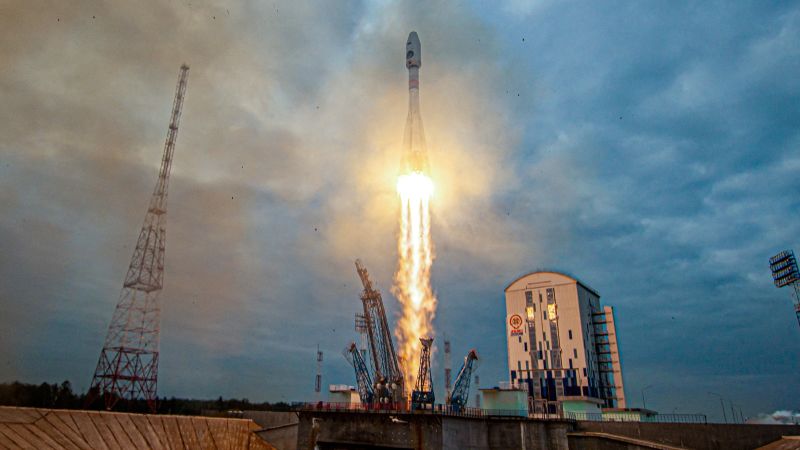Russia’s Lunar Mission Ends in Failure as Spacecraft Crashes into Moon’s Surface
Russia’s first lunar mission in decades has come to a devastating end as its Luna 25 spacecraft crashed into the moon’s surface. This incident is a major setback for Russia’s space ambitions and raises questions about the future of their lunar exploration program.
Communication with the robotic spacecraft was abruptly interrupted, leading to the crash. Russia’s space agency, Roscosmos, reported that they lost touch with Luna 25 on Saturday afternoon. Despite efforts to locate and establish contact with the spacecraft, no results were achieved.
Preliminary analysis suggests that Luna 25 deviated from its intended orbit before the collision, but the exact cause of the crash remains unknown. To investigate the reasons behind the loss of Luna 25, a specially formed commission will be conducting a thorough investigation.
This news comes just a day after the spacecraft encountered an “emergency situation” while attempting to enter a pre-landing orbit. Roscosmos shared that the emergency situation prevented the maneuver from being executed as planned.
Luna 25 was supposed to mark Russia’s first lunar landing mission in nearly five decades. The country’s previous lunar lander, Luna 24, successfully touched down on the moon’s surface in 1976. The failure of Luna 25 is a significant setback for Russia’s space program and raises doubts about their ability to achieve future lunar missions.
The spacecraft, also known as Luna-Glob-Lander, was designed to study the composition of the moon’s soil and its thin atmosphere, known as the lunar exosphere. This mission was expected to last for one year and was on track to surpass India’s Chandrayaan-3 lunar lander on its journey to the lunar surface.
The crash of Luna 25 highlights the challenges and risks associated with space exploration. It serves as a reminder that even the most advanced technologies can encounter unforeseen obstacles. As Russia mourns the loss of their lunar mission, the global space community will be closely watching to see how they respond and adapt to this setback.
Unveiling Luna 25: Witness Russia’s Lunar Lander’s Epic Moon Encounter
In a remarkable display of scientific prowess and space exploration, Russia is set to unveil its latest lunar lander, Luna 25, which promises to mark a significant milestone in the nation’s space program. This highly anticipated mission aims to explore the uncharted territories of the Moon, shedding light on its mysteries and expanding our understanding of Earth’s celestial neighbor.
Luna 25, also known as Luna-Glob, is the latest addition to Russia’s long-standing lunar exploration program. With its launch scheduled for 2021, this mission will be the first Russian attempt to land on the Moon since the Luna 24 mission in 1976. The spacecraft is equipped with state-of-the-art instruments and technology, designed to gather crucial data about the lunar surface and its geological composition.
One of the primary objectives of Luna 25 is to explore the South Pole-Aitken Basin, a vast and enigmatic lunar crater that has captivated scientists for decades. This region is believed to contain valuable resources, such as water ice, which could potentially support future human missions to the Moon. By studying the basin’s geological features and analyzing its composition, Luna 25 aims to provide valuable insights into the Moon’s formation and evolution.
The lunar lander will be equipped with a suite of scientific instruments, including a drill to collect samples from beneath the lunar surface. These samples will be analyzed to determine the presence of water ice and other volatile compounds, which could hold the key to sustaining human life on the Moon. Additionally, Luna 25 will carry a set of cameras and spectrometers to capture high-resolution images and gather data about the Moon’s topography and mineralogy.
The successful completion of the Luna 25 mission will not only be a significant achievement for Russia but also for the global scientific community. The data collected by the lander will contribute to our understanding of the Moon’s geological history, its potential for resource utilization, and its suitability for future human exploration. Furthermore, it will pave the way for future collaborative missions and international cooperation in lunar exploration.
Russia’s commitment to lunar exploration is a testament to its scientific prowess and ambition. Luna 25 represents a crucial step towards the nation’s long-term goal of establishing a permanent human presence on the Moon. By investing in space exploration, Russia is not only pushing the boundaries of human knowledge but also inspiring future generations of scientists and engineers.
As we eagerly await the launch of Luna 25, we are reminded of the remarkable achievements of previous lunar missions, such as the Apollo program and the recent Chinese Chang’e missions. These endeavors have demonstrated the immense potential of lunar exploration and the invaluable knowledge that can be gained from venturing beyond our home planet.
The unveiling of Luna 25 will undoubtedly be a momentous occasion, capturing the attention and imagination of people worldwide. It symbolizes Russia’s determination to explore the unknown, unravel the mysteries of the Moon, and contribute to the collective human endeavor of space exploration. As we witness this epic moon encounter, we are reminded of the boundless possibilities that lie ahead and the limitless potential of human ingenuity.








